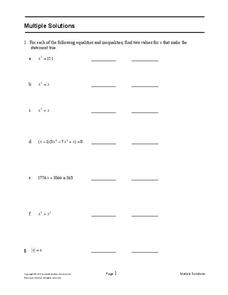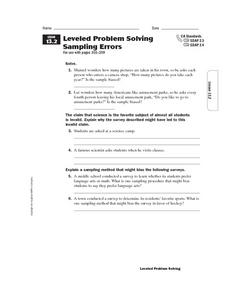University of Utah
Integer Exponents, Scientific Notation and Volume
A one-stop resource for exponents, square and cube roots, scientific notation, and volume formulas guides learners through properties of exponents. As they learn to apply these properties to operations with scientific notation,...
Achieve
False Positives
The test may say you have cancer, but sometimes the test is wrong. The provided task asks learners to analyze cancer statistics for a fictitious town. Given the rate of false positives, they interpret the meaning of this value in the...
Mathematics Assessment Project
Glasses
Clink, clink! Young mathematicians investigate drinking glasses composed of known solids (cones, cylinders, and hemispheres). Next, they determine the volumes of these glasses.
Mathematics Assessment Project
Temple Geometry
Temper your excitement of temple geometry. Using algebraic and geometry concepts to determine various measurements in a circle diagram, scholars determine the shaded area of the diagram.
Illustrative Mathematics
Running Around a Track I
The accuracy required by the design and measurement of an Olympic running track will surprise track stars and couch potatoes alike. Given a short introduction, the class then scaffolds into a detailed analysis of the exact nature of the...
Mathematics Assessment Project
Fearless Frames
Show class members how to connect algebra to geometry. A high school assessment task has pupils determine volumes of two different containers given limitations on material for box frames. Pupils then write a paragraph on...
Mathematics Assessment Project
Multiple Solutions
So many different kinds of equations and inequalities! Learners solve equations and inequalities with quadratics and other higher-order polynomials. They then classify the equations based on the number of solutions.
Mathematics Assessment Project
Square
Don't be a square! Young mathematicians determine the slope and length of a line segment. They then prove whether four given coordinate points form a square.
Curated OER
Error and Power Series
In this college level calculus worksheet, students compare two series to compute the error given the number of terms added. Students write the Maclaurin and Taylor series for the given functions. The two page worksheet contains seven...
Curated OER
Leveled Problem Solving Sampling Errors
In this sampling errors worksheet, students problem solve to find the sampling errors for each word problem. Students finish by finding a sampling method that might bias the last surveys.
Curated OER
Errors in Riemann Sums
In this Riemann Sums worksheet, students use the Riemann Sums method to approximate the area under the curves. This two-page worksheet contains three problems.
Curated OER
Tessellation Trial and Error
In this interactive instructional activity, students review attributes of equilateral polygons. They are introduced to the concept of a tessellation. Using protractors and pre-cut shapes, students arrange a variety of tiles to create...
Curated OER
Error in Measurement
For this measurement worksheet, students use a measuring tape to measure suggested items located in the classroom, such a table or desk. Students measure to the nearest 1/16th of an inch. They calculate the surface area of each item. ...
Curated OER
Finding Fibonacci
Students study and apply the Fibonacci numbers and how they occur in nature. Students solve problems using the Fibonacci numbers.
EngageNY
Solutions of a Linear Equation
Use the distributive property to solve equations. The sixth lesson in a 33-part series has scholars solve equations that need to be transformed into simpler equations first. Class members apply the distributive property to the equations...
Curated OER
Finding the Area of a Shape
In this finding the area instructional activity, students solve 25 problems in which the area of straight and curved shapes is calculated. This page is intended as an online activity, but may be completed on paper.
Curated OER
Acceleration Lab
Young Einsteins experiment with the acceleration of Hot Wheels™ toy cars down inclined planes at various angles. This classic physics lab activity is thoroughly explained in both a teacher’s guide and a student lab sheet. Science...
Curated OER
Time and Timetables
In this recognizing time and timetables instructional activity, students compare Julian and Gregorian calendars, determine leap years, and apply the formula for finding the day of week and Easter day for any year. Students solve 20...
Math Mammoth
Rounding
In this math learning exercise, learners solve the problems that are based upon the skill of rounding. The answers are written into one of the 4 sets.
Curated OER
Measuring Lengths- Consider Which Unit of Measure to Use
For this measuring lengths worksheet, students examine the appropriate unit of measure to use for a variety of items, and look at which errors are commonly made. They consider the use of millimeters, centimeters, meters, and kilometers...
Curated OER
Star Light...Star Bright
For this brightness of stars worksheet, students use a given formula using the temperature in Kelvins of a star to find its brightness. Students solve 4 problems using this equation.
Curated OER
Three Digit Addition
In this math worksheet, students solve three digit addition problems. Some of the addition problems require regrouping. The problems are set up to solve vertically.
Houghton Mifflin Harcourt
Random Samples: Estimating Population
With this estimating populations assignment, your class will learn about taking random population samples and calculating the average number of species in the samples to estimate the total population. Students use the given data to find...
Curated OER
Why Are Hot Things Red?
For this radiation and temperature worksheet, students use 2 methods to derive the Wein Displacement law that shows the relationship between the temperature of a body to the frequency where the Planck curve's value is at its maximum....























